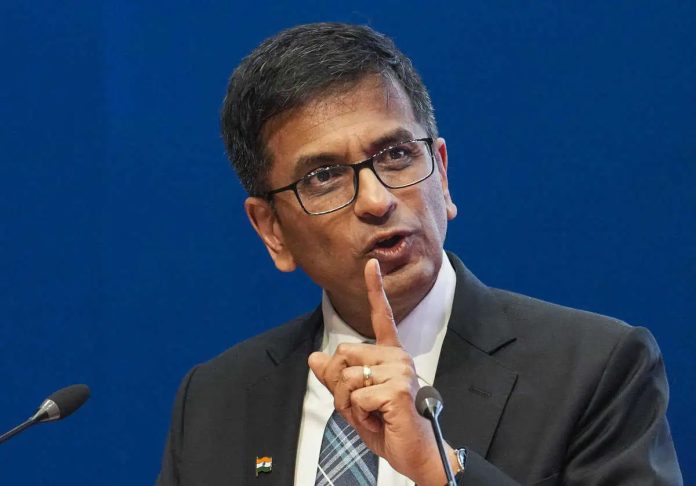NEW DELHI, Feb 13: Former Chief Justice of India, DY Chandrachud, has defended the Supreme Court’s ruling on the revocation of Article 370, stating that its inclusion in the Constitution was always intended as a transitional measure.
In an interview with journalist Stephen Sackur on BBC’s Hard Talk, Justice (Retd) Chandrachud addressed criticism of the court’s decision to uphold the Centre’s move to abrogate Jammu and Kashmir’s special status. He said that Article 370 was initially part of a chapter titled “Transitional Arrangements”, later renamed “Temporary and Transitional Arrangements”, underscoring that it was never meant to be permanent.
“The assumption at the time of the Constitution’s adoption was that transitional provisions would eventually integrate with the broader constitutional framework. Is over 75 years too short a time to phase out a transitional provision?” he asked.
Justice (Retd) Chandrachud also highlighted the importance of restoring democracy in Jammu and Kashmir, noting that an elected government is now in place.
“A peaceful transition of power has occurred to a government led by a political party different from the ruling party at the Centre. This demonstrates that democracy is functioning in Jammu and Kashmir,” he said.
On the issue of Jammu and Kashmir’s statehood, which remains unresolved despite the formation of a new government, he acknowledged the demand for full statehood, a key electoral promise of Chief Minister Omar Abdullah’s administration.
Responding to criticism that the Supreme Court failed in its constitutional role, Justice (Retd) Chandrachud rejected the claim. “The court has ensured democratic accountability, and a people’s government is now in place. The assertion that we did not uphold our constitutional mandate is incorrect,” he stated.
The former Chief Justice also addressed concerns about diversity in the Indian judiciary, particularly regarding gender and caste representation. He asserted that the judiciary is evolving, with increasing female participation.
“If you look at the district judiciary, which forms the base of the judicial system, over 50 per cent of new recruits in many states are women, with figures reaching as high as 60 or 70 per cent in some regions,” he noted.
Explaining the higher judiciary’s composition, he said it reflects the legal profession as it stood a decade ago. “With greater access to legal education, particularly for women, the gender balance in law schools is now translating into increased female representation in the judiciary,” he added.
Addressing suggestions of judicial dynasties, he recalled that his father, former Chief Justice YV Chandrachud, had discouraged him from entering a courtroom while he was in office. “That’s why I spent three years at Harvard Law School. I only entered a court after my father retired,” he said, adding that most lawyers and judges in India are first-generation legal professionals.
Justice (Retd) Chandrachud was also asked about allegations of political pressure on the judiciary, including claims that the ruling BJP has influenced court decisions. He dismissed the notion, pointing to the results of the 2024 general elections as evidence of India’s multiparty democracy.
“Regional parties continue to thrive across various states, demonstrating the strength of India’s federal structure,” he said.
On Rahul Gandhi’s defamation conviction, he noted that the Supreme Court had later suspended the ruling. He cited multiple cases in which political figures were granted bail as proof that the judiciary remains committed to protecting personal liberties.
“The Supreme Court has consistently upheld individual freedoms. While opinions may differ on specific cases, the judiciary’s track record speaks for itself,” he said.
Regarding the Citizenship Amendment Act (CAA) case, Sackur questioned why it was not heard during Chandrachud’s tenure. The former Chief Justice responded that the case remains pending and drew a comparison with the UK’s legal framework.
“If this were the UK, the courts would not have the power to invalidate legislation. In India, we do. During my tenure, I wrote 62 judgments for the Constitution Bench, addressing cases that had been pending for two decades,” he said, explaining the need to balance old and new cases.
Sackur also referred to reports that Justice (Retd) Chandrachud had sought divine guidance before ruling on the Ayodhya Ram Temple case. The former Chief Justice dismissed the interpretation, stating that his personal faith does not affect his judicial responsibilities.
“Our Constitution does not require judges to be atheists. I value my faith, but it teaches me impartiality. Judges work in conflict-ridden areas, and each has their own method of maintaining calm and equanimity. For me, meditation and prayer are important, but they reinforce my commitment to justice for all,” he explained.
The interview also touched on Prime Minister Narendra Modi’s visit to Justice Chandrachud’s residence for Ganesh Chaturthi, which sparked political criticism. He dismissed the controversy, calling it a matter of “elementary constitutional courtesies”.
“Our judiciary is mature enough to distinguish between formal interactions and judicial independence. Before and after that visit, the Supreme Court has delivered judgments against the government, including in the electoral bonds case,” he pointed out.
He concluded by reaffirming the judiciary’s role in a democracy. “The courts are not the Opposition in Parliament. Our duty is to decide cases based on the rule of law,” he said.




